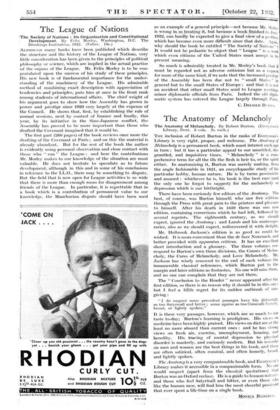The League of Nations
The Society of Nations : Its Organization and Constitutional Development. By Felix Morley, Washington, D.C. The Brookings Institution, 1932. (Faber. 18s.)
-AurnouGir many books have been published which describe the structure and the history of the League of Nations, very little consideration has been given to the principles of political philosophy or science, which are implied in the actual practice of the organs of the League. Mr. Felix Morley is to be con- gratulated upon the success of his study of these principles. His new book is of fundamental importance for the under- standing of the machinery of the League. His admirable method of combining exact description with appreciation of tendencies and principles, puts him at once in the front rank 'among students of international affairs. The chief weight of his argument goes to show how the Assembly has grown in power and prestige since 1920 very largely at the expense of the Council. He shows that, first, by establishing the rule of annual sessions, next by control of finance and finally, this year, by its initiative in the Sino-Japanese conflict, the Assembly has proved to be more important than those who 'drafted the Covenant imagined that it would be.
The first part (260 pages) of the book reviews once more the drafting of the Covenant at Paris ; and on this the material is already abundant. But for the rest of the book the author is evidently using personal observation and close contact with those who " run " the League ; and here the contributions Mr. Morley makes to our knowledge of the situation are most valuable. He does not hesitate to speculate as to future development, although in this and in some of his conclusions in reference to the I.L.O., there may be something to dispute. But the field that is now open for League activities is so wide that there is more than enough room for disagreement among friends of the League. In particular, it is regrettable that in a book which is a contribution of permanent value to our knowledge, the Manchurian dispute should have been used
as an example of a general principle—not because Mr. Morley' is wrong in so treating it, but because a hook Punished in June, 1932, can hardly be expected to give a final view of a problem which has become even more difficult since that date. .1g,aik why should the book be entitled " The Society of Nations It would not be pedantic lo object that " League " is a word which even citizens of the United States must accept in its present meaning.
So much is admirably treated in Mr. Morley's book that must be regarded not as adverse criticism but as a requesk for more of the same kind, if we note that the increased prestige of the Assembly has been due not to " small States " in general but to the small States of Europe ; and that it is not an accident that other small States send to League meetings minor diplomatic officials from Paris. Indeed the old diplo- matic system has entered the League largely through Paris C. DELISLE BURNS.














































 Previous page
Previous page